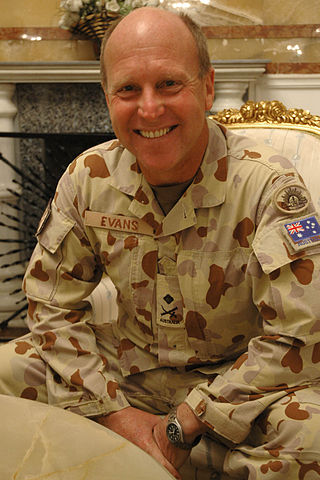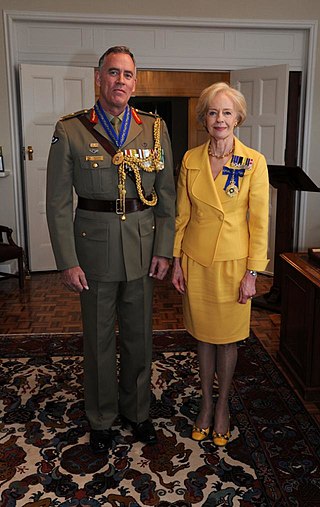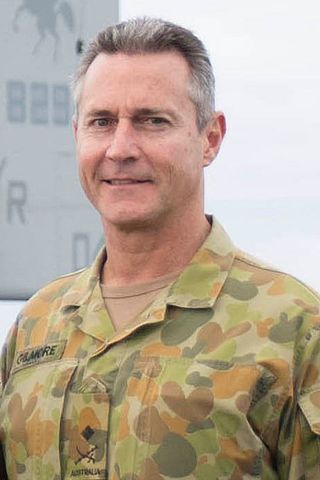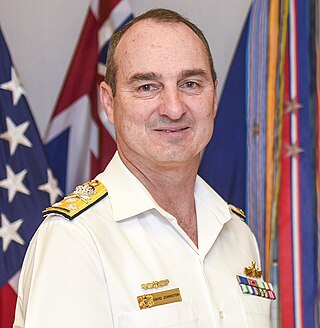Military career
Kelly entered the Royal Military College, Duntroon in January 1975, and graduated in December 1978, receiving the Sword of Honour. [3] In the same year, Kelly received a Bachelor of Arts degree from the University of New South Wales.
Allocated to the Royal Australian Infantry Corps, he was posted to the 5th/7th Battalion, Royal Australian Regiment. Kelly's first operational deployment occurred when he served with the Commonwealth Monitoring Force in Rhodesia during the Independence elections in 1979–80. Kelly served as the exchange instructor at the British Army's School of Infantry at Warminster from September 1985 to November 1987. On promotion to major, he commanded Bravo company, a rifle Company in the 1st Battalion, Royal Australian Regiment from January 1988 until December 1989. He attended the Army Command and Staff College in 1990 and then served as the Brigade Major of 3rd Brigade from January 1991 until December 1992. He was promoted to lieutenant colonel in January 1993 and served in staff appointments in Army Headquarters until December 1995. He also completed a Master of Arts in Defence Studies from the University of New South Wales in 1995.
From December 1995 to December 1997, Kelly was Commanding Officer of the 1st Battalion, Royal Australian Regiment. He then moved on promotion to colonel to Headquarters 1st Division and the Deployable Joint Force Headquarters (DJFHQ) as the Chief of Staff, a posting that involved deploying the headquarters to East Timor for Operation Stabilise, where he served as the Chief of Staff of INTERFET. Kelly was appointed a Member of the Order of Australia in the Australia Day Honours of 2000 for his "exceptional service to the Australian Army" as CO 1 RAR and COFS 1st Division. [4] He attended the Centre for Defence and Strategic Studies at the Australian Defence College in Canberra in 2000.
Kelly was promoted to brigadier and appointed to command the 3rd Brigade, Ready Deployment Force from December 2000 until December 2002. He was then posted to Headquarters United States Central Command in Tampa, Florida, serving as the first Director of the Combined Planning Group, planning operations for Operation Enduring Freedom in Afghanistan and the Horn of Africa, and Operation Iraqi Freedom in Iraq. He was appointed an Officer of the United States Legion of Merit for his exceptional service in that appointment.
Promoted to major general, Kelly assumed command of the 1st Division and the DJFHQ on 5 July 2004. He then assumed the appointment of Land Commander Australia on 15 July 2005 and served in that role until December 2008. In the Australia Day Honour's List of 2008, Kelly was appointed an Officer of the Order of Australia "for distinguished service to the Australian Army in the fields of training, personnel and operations, in particular as the Commander of the 1st Division and as the Land Commander Australia." [5]
In an official ceremony on 12 January 2009, Kelly succeeded Major General Mike Hindmarsh as Commander Joint Task Force 633 (JTF 633); in this position he commanded all Australian forces in the Middle East Area of Operations and Afghanistan for a period of 12 months. He relinquished command of JTF 633 to Major General John Cantwell on 14 January 2010. Kelly was awarded the Distinguished Service Cross in the 2011 Australia Day Honours List for his "distinguished leadership, exceptional professionalism and unwavering dedication in an extremely ambiguous and dangerous operational environment" as Commander JTF 633. [6] [7] Kelly was transferred to the Army's Standby Reserve on 5 June 2010.

Lieutenant General Kenneth James Gillespie is a retired senior officer in the Australian Army. Gillespie served as Vice Chief of the Defence Force from 2005 until 2008, then Chief of Army from 2008 until his retirement in June 2011.
Major General Michael David "Mick" Slater, is a retired senior officer of the Australian Army, who served as Commander Forces Command from November 2011 until his retirement in January 2015.

Major General John Patrick Cantwell, is a retired senior Australian Army officer.

Lieutenant General Mark Evans, is a retired senior officer in the Australian Army. He was chief of joint operations from July 2008 until his retirement in May 2011.

Major General Timothy Joseph McOwan, is a retired senior officer of the Australian Army. He served as Special Operations Commander Australia from February 2008 until January 2011, and the Australian Defence Attaché and Head Australian Defence Staff in Washington, D.C. He retired from the army in 2014.
Major General Andrew James Molan, was an Australian politician and a senior officer in the Australian Army. He was a Liberal Party senator for New South Wales from December 2017 to June 2019 and from November 2019 until his death in January 2023.

Major General Richard Gary Wilson, AO is a retired senior officer of the Australian Army. He served as Director of the Defence Intelligence Organisation from 2009 to 2011, and Chairman of the Queensland Reconstruction Authority in the wake of the 2010–11 Queensland floods.

Lieutenant General John Graham Caligari, is a retired senior officer of the Australian Army. He served as Chief Capability Development Group from October 2014 until his retirement in August 2015.

Major General Peter Warwick "Gus" Gilmore, is a retired senior officer of the Australian Army. A graduate of the Royal Military College, Duntroon, he was commissioned into the Royal Australian Infantry Corps in 1983 and spent much of his career in special forces. He commanded the Special Air Service Regiment (2001–02), led the first contingent of the Australian Special Operations Task Group in Afghanistan (2001–02), was responsible for the Coalition Advisory Support Team in Iraq (2005–06), and commanded International Security Assistance Force Special Operations Forces (2009–10). Following promotion to major general he held a succession of senior appointments, including Special Operations Commander Australia (2011–13), Deputy Chief of Army (2013–15), and Commander Forces Command (2015–16). His final appointment was as Head Military Strategic Commitments Division from 2016 to 2019.

Major General Paul Bruce Symon, is a retired senior Australian Army officer and public servant. He served as Deputy Chief of Army from 2009 to 2011, Director of the Defence Intelligence Organisation from 2011 to 2014 and, following his retirement from the army, was Director-General of the Australian Secret Intelligence Service from 18 December 2017 to 20 February 2023.

Major General Stuart Lyle Smith, is a retired senior officer of the Australian Army. He commanded the 1st Division from October 2012 until November 2015, when he was appointed Deputy Chief of Joint Operations.

General Angus John Campbell, is a retired senior officer in the Australian Army, who served as the Chief of the Defence Force from 6 July 2018 until 10 July 2024. He was previously posted as Commander Operation Sovereign Borders from September 2013 until he was appointed Chief of Army in May 2015.

Admiral David Lance Johnston, is a senior officer in the Royal Australian Navy. He served as Deputy Commander Joint Task Force 633 on Operation Slipper in 2010, Commander Border Protection Command from 2011 to 2013 and, following promotion to vice admiral, was posted as Chief of Joint Operations from 2014 until 2018. Johnston was appointed Vice Chief of the Defence Force in July 2018. He was promoted to admiral and appointed Chief of the Defence Force on 10 July 2024.
Major General Paul David McLachlan, is a retired senior Australian Army officer. He commanded the 1st Division from November 2015 to December 2018.

Lieutenant General John James Frewen, is a retired senior officer of the Australian Army. He joined the army via the Royal Military College, Duntroon and was commissioned into the Royal Australian Infantry Corps in 1986. He has commanded the 2nd Battalion, Royal Australian Regiment (2003–04), Combined Task Force 635 (2003), the 1st Brigade (2012–14), Military Strategic Commitments Division (2014–16) and Joint Task Force 633 (2017–18), and deployed on operations to Rwanda, the Solomon Islands and Afghanistan. He was appointed Principal Deputy Director-General of the Australian Signals Directorate in March 2018, and Coordinator General of the National COVID Vaccine Taskforce in June 2021. He was Chief of Joint Capabilities from September 2021 to July 2024.

Major General Christopher Antony Field, is a retired senior officer of the Australian Army. He joined the army via the Australian Defence Force Academy in 1984 and was commissioned into the Royal Australian Infantry Corps. He has commanded the 1st Battalion, Royal Australian Regiment (2003–05), Combined Joint Task Force 635 (2004–05) and the 3rd Brigade (2015–17), coordinated reconstruction efforts in Queensland in the wake of the 2010–11 Queensland floods and Cyclone Debbie, and deployed on operations to East Timor, Iraq, the Solomon Islands and Afghanistan. He was Commander Forces Command from June 2019 to February 2020, Deputy Commanding General – Operations for United States Army Central from March 2020 to November 2021, and was Assistant to the Chief of the Defence Force from 2022 until his retirement in 2023.

Major General Justin Frederick Ellwood,, commonly known as Jake Ellwood, is a retired senior officer of the Australian Army. He joined the army via the Royal Military College, Duntroon in 1989 and was commissioned into the Royal Australian Infantry Corps. He commanded the 5th Battalion, Royal Australian Regiment (2006–08), Overwatch Battle Group (West) (2007), Battle Group Tiger (2008) and the Combat Training Centre, and deployed on operations to Kosovo, East Timor, Iraq and Afghanistan. He served as Deputy Chief of Army from May to December 2018, and commanded the 1st Division from December 2018 to November 2021.

Lieutenant General Susan May Coyle, is a senior officer in the Australian Army. She joined the army as a reservist in 1987 and, following training at the Australian Defence Force Academy, was commissioned into the Royal Australian Corps of Signals in 1992. She has commanded the 104th Signal Squadron (2003–04), 17th Signal Regiment (2009–10), Task Group Afghanistan (2015) and the 6th Combat Support Brigade (2017–19), and has deployed on operations to East Timor, the Solomon Islands and Afghanistan. She was appointed Commander Joint Task Force 633, with responsibility for all Australian operations in the Middle East, from January to November 2020. She was the first woman to command the task force, which had oversight for 1,200 personnel under Operation Accordion. Coyle was Head Information Warfare from January 2021 to November 2022, Commander Forces Command from November 2022 to June 2024, and assumed the role of Chief of Joint Capabilities in July 2024.

Lieutenant General Simon Andrew Stuart, is a senior officer of the Australian Army who has served as the Chief of Army since July 2022. He was commissioned into the Royal Australian Infantry Corps from the Royal Military College, Duntroon in 1990. He has commanded the 8th/9th Battalion, Royal Australian Regiment (2008–10), Joint Task Force 631 (2010) and Combined Team Uruzgan (2012–13), and deployed to East Timor as part of Operations Warden, Tanager and Astute and to Afghanistan and the Sinai Peninsula. He was Force Commander, Multinational Force and Observers in the Sinai from 2017 to 2019, and Head Land Capability from 2020 to 2022. He succeeded Lieutenant General Rick Burr as Chief of Army on 2 July 2022.

Major General Wade Bradley Stothart, is a senior officer in the Australian Army. He joined the army via the Australian Defence Force Academy in 1987 and was commissioned into the Royal Australian Infantry Corps. He has commanded the 3rd Battalion, Royal Australian Regiment (2007–09), ANZAC Battle Group (2008) and Combined Team Uruzgan (2013), and deployed on operations to Bosnia and Herzegovina, Timor-Leste as part of Operations Tanager and Astute, and to Afghanistan and Kuwait. He was appointed Head People Capability in December 2021.

















